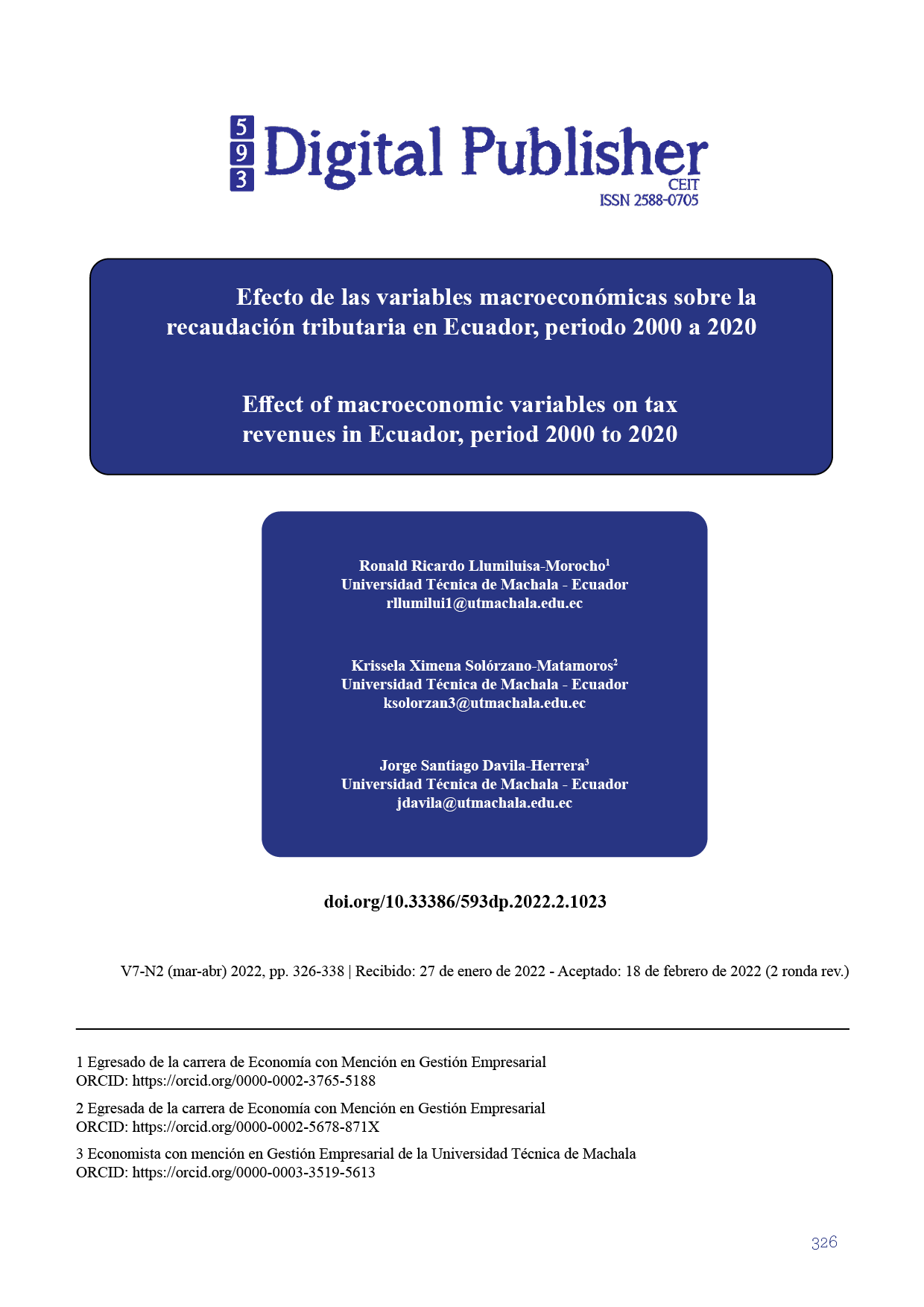Effect of macroeconomic variables on tax revenues in Ecuador, period 2000 to 2020
Main Article Content
Abstract
In Ecuador, the financing of social projects is achieved through the significant contribution of tax collection, which is vulnerable to the effects generated by economic variables. The objective of this study is to determine the incidence of economic variables on tax collection, through the application of an econometric model, to reflect whether they have a positive or negative impact. Data are obtained from official sources from 2000 to 2020 and an Ordinary Least Squares (OLS) model, error cointegration of Engle and Granger (1987) and a Fully Modified Ordinary Least Squares (FMOLS) model proposed by Phillips and Hansen (1990) are used. The results show that total population, employment rate, GDP per capita, tax burden and inflation have a positive effect on total tax revenue. While, the corruption index and tax burden squared have a negative effect on total tax revenues. The determinants that have the greatest positive and negative effect on total tax collection are GDP per capita with 3.035% and the corruption index with -0.282%. Therefore, political decision making in Ecuador should be directed mainly towards the incentive of production and the fight against corruption.
Downloads
Article Details

This work is licensed under a Creative Commons Attribution-NonCommercial-ShareAlike 4.0 International License.
1. Derechos de autor
Las obras que se publican en 593 Digital Publisher CEIT están sujetas a los siguientes términos:
1.1. 593 Digital Publisher CEIT, conserva los derechos patrimoniales (copyright) de las obras publicadas, favorece y permite la reutilización de las mismas bajo la licencia Licencia Creative Commons 4.0 de Reconocimiento-NoComercial-CompartirIgual 4.0, por lo cual se pueden copiar, usar, difundir, transmitir y exponer públicamente, siempre que:
1.1.a. Se cite la autoría y fuente original de su publicación (revista, editorial, URL).
1.1.b. No se usen para fines comerciales u onerosos.
1.1.c. Se mencione la existencia y especificaciones de esta licencia de uso.
References
Alvear, P., Elizalde, L., y Salazar, M. (2018). Evolución del sistema tributario ecuatoriano y su influencia en el presupuesto general del estado. Revista Observatorio de la Economía Latinoamericana, 1-13. http://www.eumed.net/2/rev/oel/2018/02/sistema-tributario-ecuador.html
Andrejovska, A., y Pulikova, V. (2018). Tax Revenues in the Context of Economic Determinants. Montenegrin Journal of Economics, 14(1), 133-141 . doi:https://doi.org/10.14254/1800-5845/2018.14-1.10
Awasthi, R., Le, T. M., y You, C. (2020). Determinants of Property Tax Revenue : Lessons from Empirical Analysis. Policy Research Working Paper(9399), 1-21. https://openknowledge.worldbank.org/handle/10986/34485
Banco Central del Ecuador (BCE). (2021, Noviembre 20). Banco Central del Ecuador. Banco Central del Ecuador: https://www.bce.fin.ec/index.php/informacioneconomica
Banco Mundial (BM). (2021, Noviembre 20). Banco Mundial. Banco Mundial: https://datos.bancomundial.org/pais/ecuador
Basheer, M., Ahmad, A., y Hassan, S. (2019). Impact of economic and financial factors on tax revenue: Evidence from the Middle East countries. Accounting, 5(2), 53-60. doi:http://dx.doi.org/10.5267/j.ac.2018.8.001
Bejarano, H. (2008). Verificación empírica de la curva de Laffer en la economía colombiana. Revista Facultad de Ciencias Económicas: Investigación y Reflexión, 16(1), 151-164. doi:http://www.scielo.org.co/pdf/rfce/v16n1/v16n1a11.pdf
Bernal, C. (2010). Metodología de la Investigación: administración, economía, humanidades y ciencias sociales (Tercera Edición ed.). Colombia: PEARSON EDUCACIÓN. https://abacoenred.com/wp-content/uploads/2019/02/El-proyecto-de-investigaci%c3%b3n-F.G.-Arias-2012-pdf.pdf
Bird, R. M., Martinez-Vazquez, J., y Torgler, B. (2008). Tax Effort in Developing Countries and High Income Countries: The Impact of Corruption, Voice and Accountability. Economic Analysis and Policy, 38(1), 55-71. doi:https://doi.org/10.1016/S0313-5926(08)50006-3
Cacay, J. C., Ramírez, G., y Campuzano, J. (2021). Efecto del Crecimiento Económico y la Presión Fiscal sobre el Impuesto al Valor Agregado. Revista San Gregorio, 1(47), 111-125. doi:https://revista.sangregorio.edu.ec/index.php/REVISTASANGREGORIO/article/view/1750/8-CACAY
Casas, J. (2015). Diversificación de las exportaciones y su impacto sobre el crecimiento económico en Colombia. Universidad del Valle, Departamento de Economía. http://hdl.handle.net/10893/8674
Castañeda, V. M. (2015). La moral tributaria en América Latina y la corrupción como uno de sus determinantes. Revista Mexicana de Ciencias Políticas y Sociales, 60(224), 103-132. doi:https://doi.org/10.1016/S0185-1918(15)30005-2
Comisión Económica para América Latina (CEPAL). (2021, Noviembre 20). CEPALSTAT Bases de datos y publicaciones estadísticas. CEPALSTAT Bases de datos y publicaciones estadísticas: https://statistics.cepal.org/portal/cepalstat/index.html?lang=es
Cruz, G. (2018). Análisis de la inversión en capital público productivo en el crecimiento de la economía colombiana. Para el período 1951-2014. Universidad del Valle, Departamento de Economía. http://hdl.handle.net/10893/11248
De la Cruz, R. M., y Ramos, M. G. (2020). La corrupción y su incidencia en la recaudación tributaria en la región Junín: 2005-2018. Universidad Continental, Escuela de Posgrado. https://hdl.handle.net/20.500.12394/7546
Enami, N. L., y Taqdiri, A. (2019). Fiscal policy, inequality, and poverty in Iran: assessing the impact and effectiveness of taxes and transfers. Middle East Development Journal, 11(1), 49-74. doi:https://doi.org/10.1080/17938120.2019.1583510
Engle, R., y Granger, C. (1987). Co-Integration and Error Correction: Representation, Estimation, and Testing. Econometrica, 55(2), 251-276. doi:https://doi.org/10.2307/1913236
Estévez, Z., y Rocafuerte, J. (2018). La conciencia tributaria en el proceso de recaudación de impuestos en Santa Elena. Clío América, 12(23), 8-24. doi:https://doi.org/10.21676/23897848.2606
Figueroa, I. (2019). Presión Tributaria del Ecuador, periodo 2000-2018: Un Análisis desde el Enfoque de la Teoría de La Curva de Laffer. Universidad Espíritu Santo, Facultad de Postgrados, Guayaquil. http://repositorio.uees.edu.ec/handle/123456789/3090
Garcidueñas, J. (2020). Determinantes de la inversión extranjera directa en las economías del APEC en el periodo 2001 - 2018. Universidad Michoacana de San Nicolás de Hidalgo, Instituto de Investigaciones Económicas y Empresariales. Ciencias en Negocios Internacionales. http://bibliotecavirtual.dgb.umich.mx:8083/xmlui/handle/DGB_UMICH/2682
Garzón, M., Ahmed, A., y Peñaherrera, J. (2018). El sistema tributario y su impacto en la Economía Popular y Solidaria en el Ecuador. Revista UNIANDES Episteme, 5(1), 38-53. https://dialnet.unirioja.es/servlet/articulo?codigo=6756345
Gnangnon, S. K. (2021). Export product diversification, poverty and tax revenue in developing countries. The Journal of International Trade & Economic Development, 30(7), 957-987. doi:https://doi.org/10.1080/09638199.2021.1919182
Guerrero, R. (2019). Análisis de la recaudación tributaria en el presupuesto fiscal del estado ecuatoriano, periodo 2013- 2017. Revista Observatorio de la Economía, 1-7. https://www.eumed.net/rev/oel/2019/09/recaudacion-tributaria-ecuador.html
Gujarati, D., y Porter, D. (2010). Econometría. Mexico: McGraw-Hill. https://www.academia.edu/40331807/Gujarati_Porter_ECONOMETRIA
Hernández, R., Fernández, C., & Baptista, M. (2014). Metodología de la investigación. México D.F: McGraw-HIill/Interamericana Editores. http://observatorio.epacartagena.gov.co/wp-content/uploads/2017/08/metodologia-de-la-investigacion-sexta-edicion.compressed.pdf
Macias, F., Villamar, A., y Álava, M. F. (2019). La recaudación de impuestos y los niveles de pobreza en el Ecuador. Revista Caribeña de Ciencias Sociales, 1-12. https://www.eumed.net/rev/caribe/2019/04/recaudacion-impuestos-ecuador.html
Mannan, K. A. (2020). Socio-economic Factors of Tax Compliance: An Empirical Study of Individual Taxpayers in the Dhaka Zones, Bangladesh. The Cost and Management, 48(6), 36-48. doi:https://dx.doi.org/10.2139/ssrn.3769973
Mendieta, P. (2018). Verificación del curva de Laffer, caso Ecuador 2016 – 2017. Revista Killkana Sociales, 2(3), 101-108. doi:https://doi.org/10.26871/killkana_social.v2i3.329
Nasution, M. K., Santi, F., Husaini, Fadli, y Pirzada, K. (2020). Determinants of tax compliance: A study on individual taxpayers in Indonesia. Entrepreneurship and Sustainability Issues, 8(2), 1401-1418. doi:http://doi.org/10.9770/jesi.2020.8.2(82
Neog, Y., y Gaur, A. K. (2020). Macro-economic determinants of tax revenue in India: an application of dynamic simultaneous equation model. International Journal of Economic Policy in Emerging Economies, 13(1), 13-35. https://www.inderscienceonline.com/doi/abs/10.1504/IJEPEE.2020.106679
Newman, W., y Nokhu, M. (2018). Evaluating the impact of tax knowledge on tax compliance among small medium enterprises in a. Academy of Accounting and Financial Studies Journal, 22(6), 1–14. https://www.abacademies.org/articles/Evaluating-the-Impact-of-Tax-Knowledge-on-Tax-Compliance-Among-Small-Medium-Enterprises-1528-2635-22-6-302.pdf
Olushlola, O. K., Oliver, B. U., Okon, M. E., y Osang, O. D. (2020). Tax Revenue and Economic Growth in Nigeria. (An Econometric Approach). IIARD International Journal of Economics and Business Management, 6(2), 52-60. https://iiardpub.org/get/IJEBM/VOL.%206%20NO.%202%202020/TAX%20REVENUE%20AND%20ECONOMIC.pdf
Organización para la Transparencia Internacional. (2021, Diciembre 29). Organización para la Transparencia Internacional. Organización para la Transparencia Internacional: https://www.transparency.org/en/countries/ecuador
Pérez, A., Cevallos, A., y Pico, A. (2018). La recaudación tributaria y las variables económicas en el Ecuador. Revista Observatorio de la Economía Latinoamericana, 1-14. https://www.eumed.net/rev/oel/2018/09/recaudacion-tributaria-ecuador.html
Phillips, P. C., y Hansen, B. E. (1990). Statistical Inference in Instrumental Variables Regression with I(1) Processes. Review of Economics Studies, 57(1), 99–125. doi:https://doi.org/10.2307/2297545
Ramírez, K., y Brito, L. (2021). Impacto de la recaudación tributaria en el crecimiento económico de Ecuador en el periodo 2009-2019. X-Pedientes Económicos, 5(13), 6–23. https://ojs.supercias.gob.ec/index.php/X-pedientes_Economicos/article/view/76
Sarel, M. (1996). Nonlinear Effects of Inflation on Economic Growth. IMF Staff Papers, 43(1), 199-215. doi:https://doi.org/10.2307/3867357
Serrano, J. C. (2013). Análisis dinámico de la recaudación tributaria en el Ecuador aplicando modelos VAR. Revista Fiscalidad, 123-167.
Servicio de Rentas Internas (SRI). (2021, Julio 10). Estudios, Investigaciones e Indicadores. Estudios, Investigaciones e Indicadores: https://www.sri.gob.ec/estudios-investigaciones-e-indicadores#%C3%ADndice
Urgilés, G., y Chávez, K. (2017). Evolución de la recaudación tributaria y gasto público en el ecuador durante la última década. Visión Empresarial(7), 139-155. doi:https://doi.org/10.32645/13906852.313
Vega, F., Brito, L., Apolo, N., y Sotomayor, J. (2020). Influencia de la recaudación fiscal en el valor agregado bruto de los cantones de la provincia de El Oro (Ecuador), para el periodo 2007-2017. Revista espacios, 41(15), 15. https://www.revistaespacios.com/a20v41n15/a20v41n15p15.pdf
Wawire, N. (2017). Determinants of value added tax revenue in Kenya. Journal of Economics Library, 4(3), 322-344. http://kspjournals.org/index.php/JEL/article/view/1391
Wooldridge, J. (2010). Introducción a la econometría. Un enfoque moderno (Cuarta ed.). México: Cengage Learning. https://herioscarlanda.files.wordpress.com/2018/10/wooldridge-2009-introduccic3b3n-a-la-econometrc3ada-un-enfoque-moderno.pdf
Yaru, M. (2020). Determinants of tax collection by local governments: empirical evidence from Kwara State. Journal of Taxation and Economic Development, 19(2), 19-33. https://econpapers.repec.org/scripts/redir.pf?u=https%3A%2F%2Fjournal.citn.org%2Fhome%2Fjournal%2F54;h=repec:ris:jotaed:0043




